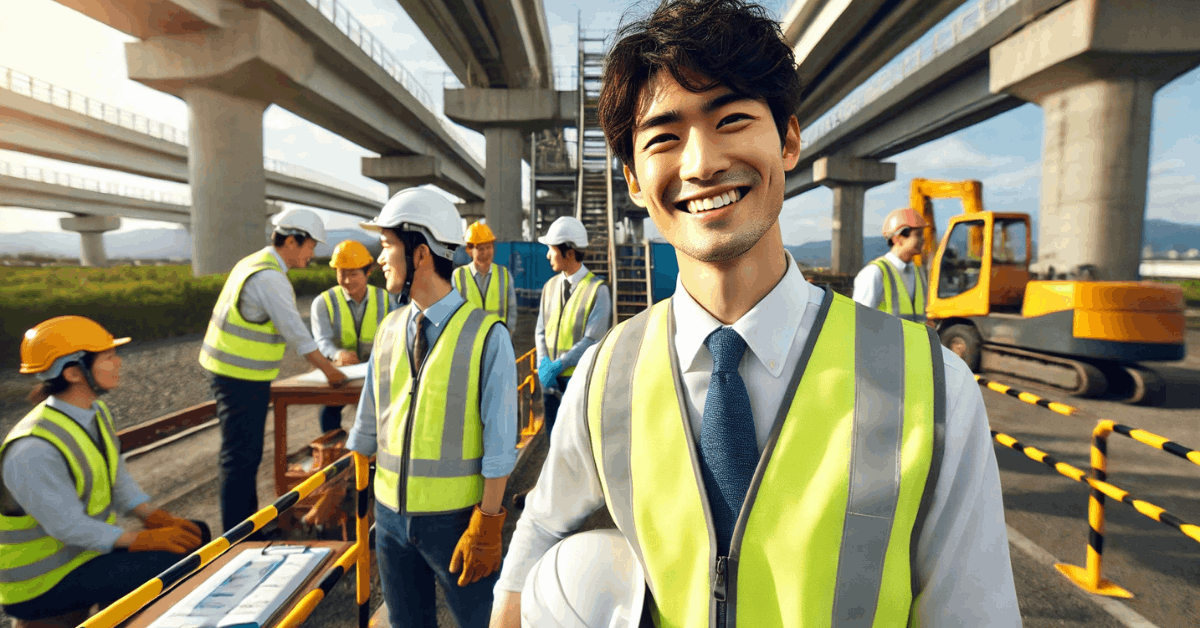This article is designed to guide you through everything you need about construction jobs in Japan. It covers the key sectors, qualifications, and how to apply.
You’ll also get insights into the salary, benefits, and challenges of working in this field. Whether you’re starting your career or looking to make a move, this article will lay the foundation for your success.

Main Areas of the Construction Industry
The construction industry in Japan is vast, with several key sectors offering various opportunities. These sectors cater to different needs, making it a diverse field.
- Residential Construction: Residential construction focuses on building homes, apartments, and housing developments. It plays a vital role in meeting the growing demand for housing in urban areas.
- Commercial and Infrastructure Projects: This sector involves large-scale projects like office buildings, shopping centers, and bridges. These projects are essential to supporting Japan’s economy and urban development.
- Environmental and Sustainable Construction: Environmental and sustainable construction focuses on eco-friendly building practices. It emphasizes reducing environmental impact while meeting modern building standards.
- Technology in Construction: Technology in construction, including robotics and automation, changes how projects are managed and executed. These innovations increase efficiency, safety, and precision on construction sites.
Key Skills and Qualifications Needed
Several essential skills and qualifications are required to work in the construction industry. These include technical expertise, physical ability, and specific certifications.
Technical Skills
Technical engineering, architecture, or project management skills are essential for many roles. These skills help manage complex projects, design structures, and ensure quality construction.
Physical Demands and Safety Protocols
Construction work can be physically demanding, requiring strength and stamina. Strict safety protocols are critical to prevent accidents and ensure a safe working environment.
Language Requirements
While some companies offer translation services, having Japanese proficiency can be advantageous. It helps in communication and understanding local work processes.
Licenses or Certifications Needed
Certain roles in construction require specific licenses or certifications, such as building licenses. These qualifications ensure workers meet industry standards and legal requirements.
How to Apply for Construction Jobs in Japan?
Applying for construction work in Japan involves using various methods to find job opportunities. Here’s how you can approach it:
Job Search Platforms
There are several online platforms to help you find construction roles in Japan.
Key Employers and Recruitment Agencies
Many companies and recruitment agencies specialize in the construction industry.
Networking in the Industry
Building a network is essential for getting leads and hearing about job openings.
- Attend industry events or conferences
- Join local construction unions
- Connect on LinkedIn and other professional networks
Visa Requirements for Foreign Workers
Foreign workers need the proper visa to work in Japan.
- Engineer/Specialist in Humanities visa
- Skilled labor visa
- Technical Intern Training visa
- Work closely with immigration experts to ensure correct documentation
Salary Expectations in the Industry
Salaries vary depending on the role, location, and experience. Here’s what you can expect for different positions.
Average Salaries for Different Roles
The salary range can differ based on the role and expertise.
- Construction Workers: ¥3,000,000 to ¥4,500,000 per year
- Engineers: ¥5,000,000 to ¥7,000,000 per year
- Project Managers: ¥6,000,000 to ¥10,000,000 per year
Comparison of Salaries Across Regions in Japan
Salaries tend to be higher in larger cities like Tokyo and Osaka. Rural areas generally offer lower pay, but the cost of living is also cheaper. Tokyo, for example, offers more competitive wages due to high demand.
Opportunities for Overtime Pay and Bonuses
Overtime is often available in the industry, especially on larger projects. Employees may receive extra pay for working beyond standard hours. Annual bonuses are typical in Japan, adding to the overall income.
Benefits of Working in Japan
In addition to a salary, there are several key benefits for workers. These can vary but generally include health coverage and career growth opportunities.
- Health Insurance and Social Security: Most workers have health insurance and social security. This ensures medical coverage and support in case of injury or illness.
- Pension Plans and Retirement Benefits: Employees typically have access to pension plans to prepare for retirement. This is part of Japan’s social security system, ensuring long-term financial security.
- Paid Leave (Vacation Days, Sick Leave): Workers receive paid vacation days and sick leave. These benefits help maintain a balance between work and personal life.
- Career Advancement Opportunities: There are often clear pathways for career advancement in the industry. Workers can take on higher roles with additional training and experience.
- Work-life Balance and Safety Measures: Companies prioritize work-life balance by offering reasonable hours. Safety measures are a key part of the industry, ensuring that workers are protected on the job.
Challenges in the Industry
While the industry offers many opportunities, there are some challenges workers face. These can include long hours, cultural differences, and the job’s physical demands.
High Work Demands and Long Hours
The work can be physically and mentally demanding, often requiring long hours. Deadlines and project size can add extra pressure. This means workers might need to work overtime regularly.
Language Barriers and Cultural Differences
Language barriers can be complex for non-Japanese speakers, especially on job sites. Cultural differences, like communication styles, can lead to misunderstandings. Being aware of these differences helps one adapt to the work environment.
Weather Conditions and Physical Strain
Outdoor work in extreme weather can take a physical toll. Workers are exposed to hot summers and cold winters. These conditions can make daily tasks more exhausting and challenging.
Living in Japan: Cost of Living and Cultural Considerations
Living in Japan comes with a unique set of challenges and opportunities. Here’s what you need to know about cost and adapting to life there.
Cost of Housing, Transportation, and Utilities
The cost of housing in major cities like Tokyo can be high, especially for smaller apartments. Transportation is efficient but can add up depending on where you live. Utilities like electricity and water are usually affordable but vary based on location.
Cultural Adaptation and Living in a New Country
Adapting to Japan’s culture and lifestyle might take time. Learning local customs and traditions will help in both professional and personal life. Patience and openness to new experiences are key to adjusting well.
Support Systems for International Workers
Japan offers various support systems for international workers. Many companies assist with housing and settling in. Community groups and resources are also available to help workers adapt to their new life.
Wrapping Up Your Journey into Construction Jobs in Japan
Construction jobs in Japan provide many opportunities for those looking to build a strong career. The industry remains an attractive option with competitive salaries, solid benefits, and clear paths for career growth.
While the work can be demanding, the rewards—such as health insurance and paid leave—make it worthwhile if you’re prepared to face challenges. A career in Japan’s construction industry can offer long-term success and stability.











